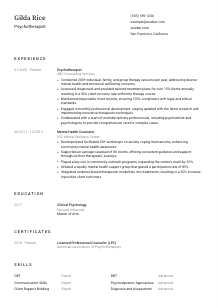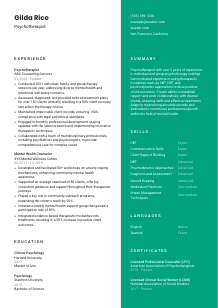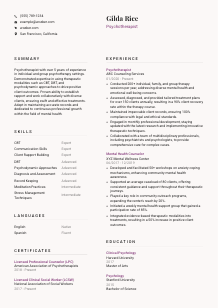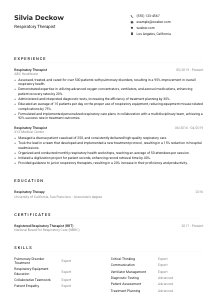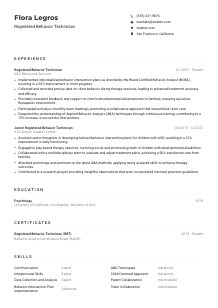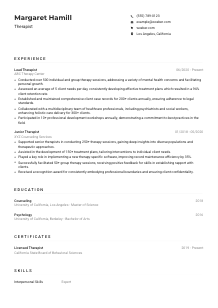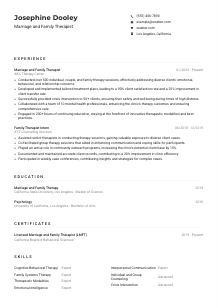Psychotherapist CV Example
Delving into minds, but stuck on what to pen? Explore this Psychotherapist CV example, designed with Wozber free CV builder. See how effortlessly you can channel your therapeutic insight to resonate with job needs, carving a career that nurtures hearts and heals souls!
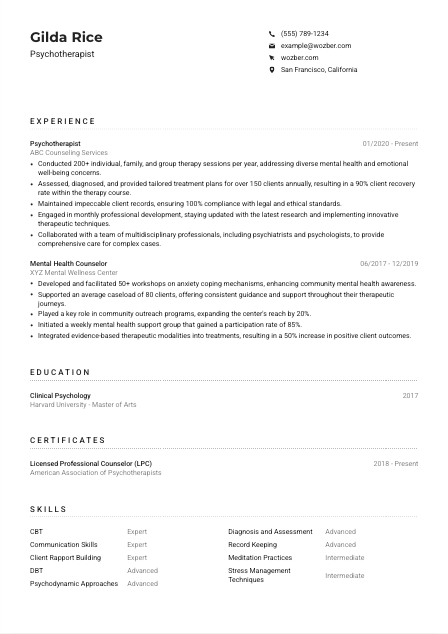
How to write a Psychotherapist CV?
Embarking on a journey to land your dream Psychotherapist role? Congratulations! A well-crafted CV is your passport to a fulfilling career, making a powerful statement about your expertise and compassion in helping others navigate their mental health. Leveraging Wozber's free CV builder, this guide is your beacon to creating a CV that seamlessly aligns with the specific Psychotherapist role you're eyeing.
Ready to channel your skills and experiences into a CV as impactful as your therapeutic sessions? Let's dive in and sculpt your professional narrative.
Personal Details
First impressions are pivotal, and in the realm of job applications, your personal details section is where you start to shine. For a Psychotherapist, this means presenting yourself not just as a professional, but as a compassionate and approachable individual. Let's decode how to tailor this section to resonate deeply with your potential employers.
1. Name and Title
Begin with your full name in a clean, prominent font. Directly under your name, specify your professional title, i.e., 'Psychotherapist,' to immediately establish your identity in the mental health field.
2. Contact Details
Provide your current phone number and a professional email address. A tip here is to use an email format like firstname.lastname@email.com, which portrays professionalism. Incorporating your location, specifically if you're in or willing to relocate to San Francisco as per the job description, subtly aligns you with the role's logistical requirements.
3. Professional Profile
In the digital age, a LinkedIn profile or a personal website detailing your professional journey can be invaluable. Ensure it's updated to mirror your CV. This bridges your digital and paper personas, offering a holistic view of your qualifications.
4. Tailored Job Title
Echo the job title from the description, 'Psychotherapist,' below your name. This acts as a keyword for ATS optimisation, increasing the chances of your CV passing the initial digital screening.
5. Privacy Considerations
Skip any unnecessary personal details such as age or marital status. Concentrate on sharing information that directly supports your professional candidacy.
Takeaway
Craft this section to be the handshake that precedes the conversation. By clearly presenting yourself as a professional dedicated to the field of psychotherapy, you set a confident tone for the rest of your CV. It's not just about filling in details; it's about starting to tell your story.





Experience
As a Psychotherapist, your experience section is where you narrate your journey of impact. Here, you'll showcase your expertise in therapeutic methods and your dedication to clients' well-being, directly reflecting the requirements of your desired role.
- Conducted 200+ individual, family, and group therapy sessions per year, addressing diverse mental health and emotional well‑being concerns.
- Assessed, diagnosed, and provided tailored treatment plans for over 150 clients annually, resulting in a 90% client recovery rate within the therapy course.
- Maintained impeccable client records, ensuring 100% compliance with legal and ethical standards.
- Engaged in monthly professional development, staying updated with the latest research and implementing innovative therapeutic techniques.
- Collaborated with a team of multidisciplinary professionals, including psychiatrists and psychologists, to provide comprehensive care for complex cases.
- Developed and facilitated 50+ workshops on anxiety coping mechanisms, enhancing community mental health awareness.
- Supported an average caseload of 80 clients, offering consistent guidance and support throughout their therapeutic journeys.
- Played a key role in community outreach programs, expanding the center's reach by 20%.
- Initiated a weekly mental health support group that gained a participation rate of 85%.
- Integrated evidence‑based therapeutic modalities into treatments, resulting in a 50% increase in positive client outcomes.
1. Unpack the Job Description
Highlight keywords and critical skills in the job posting. For instance, 'conducted 200+ individual, family, and group therapy sessions per year' aligns perfectly with the responsibility to 'conduct individual, family, or group sessions' as mentioned in the description.
2. Role and Company Structure
Organize your experience in reverse chronological order. List your job title, then the company name, followed by your employment period. This structure is not only ATS-friendly but also allows hiring managers to quickly understand your career progression.
3. Achievement-Focused Bullet Points
For each role, craft bullet points that highlight your achievements. Use numbers to quantify your impact, such as 'resulted in a 90% client recovery rate within the therapy course,' directly showcasing your effectiveness in client treatment.
4. Quantify Where Possible
Quantifiable achievements offer a concrete measure of your success. For instance, mentioning 'over 150 clients annually' effectively communicates the volume of work and the trust placed in your expertise.
5. Relevancy is Key
Focus on experiences that directly align with the job requirements. This might mean highlighting your familiarity with 'CBT, DBT, and psychodynamic approaches,' which are mentioned as desired skills in the job description.
Takeaway
Look at your experience section as a series of impactful stories rather than merely a list of duties. Tailor these narratives to the role you're applying for, making it impossible for hiring managers to overlook the profound impact you could make within their team.
Education
In the mental health field, your educational background is not just a testament to your knowledge; it's the bedrock of your practice. Let's delve into how you can frame this section to reflect both your qualifications and your readiness for the Psychotherapist role.
1. Highlight Required Degrees
Start by listing your highest degree first, especially if it directly meets the job's educational requirement. For example, 'Master of Arts in Clinical Psychology' clearly satisfies the 'Master's degree or higher in psychology, counseling, or a related field' requirement.
2. Simple and Straightforward Layout
Maintain a clear, easy-to-follow format: your degree, followed by the field of study, the institution, and your graduation year. This straightforward approach ensures your qualifications are immediately apparent.
3. Match Your Degree to the Job
If your degree directly relates to the job requirements, make sure it's clearly stated. This demonstrates to hiring managers you have the fundamental knowledge necessary for the position from the get-go.
4. Coursework and Other Achievements
Though not always necessary, listing relevant coursework, honors, or awards can further establish your commitment and success in your field, especially if you're early in your career.
5. Additional Educational Insights
Including scholarships, memberships in psychological associations, or participation in relevant workshops can also enrich this section, painting a picture of a well-rounded and engaged professional.
Takeaway
Your education section is a cornerstone of your CV, underscoring your dedication to your profession. Craft it to highlight not just your academic achievements, but also your journey towards becoming a compassionate and skilled Psychotherapist.
Certificates
In the field of psychotherapy, certifications are not mere embellishments; they are essential indicators of your specialized skills and commitment to continuous learning. Here's how to thoughtfully present your certifications in alignment with your application for a Psychotherapist position.
1. Distill the Job Essentials
First, identify the certifications explicitly mentioned in the job description, such as LPC, LCSW, or LMFT. These are non-negotiables and must be prominently displayed in your CV.
2. Prioritize Pertinent Certifications
List your most relevant certifications first to immediately draw the hiring manager's attention. Remember, this isn't about volume but relevance to the Psychotherapist role.
3. Dates Matter
For each certification, include the issuing organisation and the validity period, if applicable. This provides a timeframe of your achievements and reassures employers of your current qualifications.
4. Continuous Improvement
The field of psychotherapy is ever-evolving. Show a commitment to professional growth by regularly updating your certifications and pursuing new ones relevant to your area of expertise.
Takeaway
Think of each certification as a testament to your dedication to your profession and your clients. By curating a list of relevant certifications, you're not only meeting the job requirements but also demonstrating your commitment to providing the highest level of care.
Skills
For a Psychotherapist, your skills section is more than a list; it's a curated showcase of your therapeutic expertise and interpersonal abilities. Let's tailor this section to highlight how your unique skill set aligns with the needs of your prospective role.
1. Extracting from the Job Description
Carefully read the job posting to identify both hard and soft skills that are valued. For instance, expertise in 'CBT, DBT, and psychodynamic approaches' is directly applicable, as is 'strong interpersonal and communication skills.'
2. Match and Prioritize
Align your skills with those mentioned in the job posting. Prioritize those that are most relevant to the role, placing them at the top of your list to catch the eye of the hiring manager.
3. Strategic Organisation
Organize your skills into categories, such as therapeutic modalities and interpersonal skills, to make it easy for hiring managers to see your depth in both clinical expertise and client relations.
Takeaway
Your skills section is a powerful venue to communicate your professional value. By strategically aligning it with the role's requirements, you're not only showcasing your competencies but also illustrating your potential contribution to the team.
Languages
In a diverse city like San Francisco, the ability to communicate in multiple languages can be a significant asset for a Psychotherapist. Here's how to effectively highlight your linguistic prowess in your CV.
1. Assess the Job's Language Needs
The job description emphasizes 'proficient English language communication skills.' Ensure you list English at the top, stating your proficiency level as 'native' or 'fluent' as applicable.
2. Showcase Additional Languages
If you speak additional languages, order them by proficiency after English. This demonstrates your ability to engage with a broader range of clients.
3. Honesty in Proficiency Levels
Be accurate in evaluating your language skills. This ranges from 'native' to 'basic,' providing a clear picture to employers of where you can engage most effectively.
4. Cultural Competence
Understanding and engaging with diverse cultural backgrounds is key in psychotherapy. Highlighting additional languages can be a proxy for showing your capability in this area.
5. Reflecting on the Role's Scope
Given the diverse clientele in San Francisco, additional languages can enrich your application, showcasing your readiness to serve a wide array of clients.
Takeaway
Your linguistic skills are more than communicative tools; they are bridges to understanding and empathy. By showcasing your multilingual abilities, you're not just ticking a box but highlighting a profound asset in connecting with and aiding clients.
Summary
The summary is your CV's opening narrative, setting the tone for your professional story. For a Psychotherapist, this is where you encapsulate your expertise, empathy, and dedication in a few compelling sentences.
1. Setting the Tone
Start with a crisp introduction that positions you as a seasoned Psychotherapist. This isn't just about years; it's about the depth of your experience and the breadth of your skills.
2. Meeting the Job's Core
'Demonstrated expertise in using therapeutic modalities such as CBT, DBT, and psychodynamic approaches,' directly addresses the requirements, showing you're already in sync with the job's needs.
3. Reflecting Accomplishments
Include a line about your achievements, such as 'resulted in a 90% client recovery rate within the therapy course,' offering a snapshot of the tangible impact you've had in your roles.
4. Keeping It Concise
Pack a punch in 3-5 lines, making every word count. This is your elevator pitch; make it memorable, impactful, and reflective of your unique contribution to the field of psychotherapy.
Takeaway
Your summary is the hook that catches the reader's attention. Tailored finely to the Psychotherapist role, it sets the stage for the detailed narrative that follows. Let it resonate with confidence, compassion, and a readiness to make a difference.
Launching Your Psychotherapist Journey
With these tailored insights, you're now equipped to craft a CV that not only meets the job specifications but truly stands out. Remember, your CV is more than a document; it's a testament to your dedication to improving lives. Using Wozber's free CV builder, including its ATS-friendly CV template and ATS CV scanner, you're not just preparing a CV—you're preparing to make your mark in the world of psychotherapy. Go forth with confidence, and let your career flourish!

- Master's degree or higher in psychology, counseling, or a related field.
- Valid state license or certification as a Licensed Professional Counselor (LPC), Licensed Clinical Social Worker (LCSW), or Licensed Marriage and Family Therapist (LMFT).
- Minimum of 3 years of post-licensure experience in individual or group psychotherapy settings.
- Proficiency in using evidence-based therapeutic modalities such as CBT, DBT, and/or psychodynamic approaches.
- Strong interpersonal and communication skills, with the ability to establish a therapeutic rapport and work collaboratively with clients.
- Proficient English language communication skills necessary.
- Must be located in or willing to relocate to San Francisco, CA.
- Conduct individual, family, or group sessions to help clients address their mental health and emotional well-being.
- Assess, diagnose, and provide appropriate treatment plans for clients based on their presenting issues.
- Maintain accurate and confidential client records, adhering to all legal and ethical standards.
- Continuously engage in professional development, staying updated with new research and therapeutic techniques.
- Collaborate with multidisciplinary teams, including psychiatrists, psychologists, and other healthcare professionals, when necessary.





